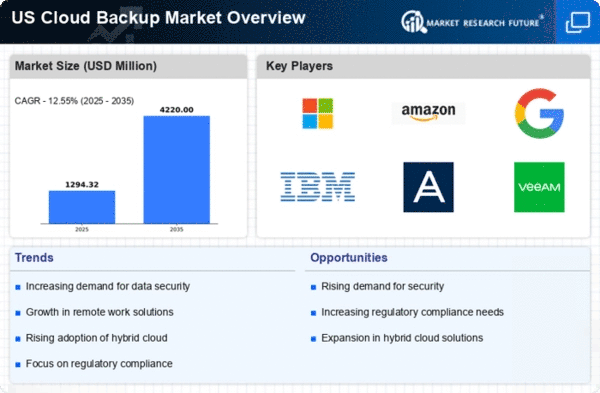Growing Cybersecurity Threats
The cloud backup market is increasingly influenced by the rising prevalence of cybersecurity threats, which pose significant risks to data integrity. With cyberattacks becoming more sophisticated, organizations are compelled to invest in comprehensive backup solutions to protect their sensitive information. In 2025, it is estimated that the cybersecurity market will reach $300 billion in the US, highlighting the urgency for businesses to fortify their data protection measures. This heightened awareness of cybersecurity risks is likely to drive growth in the cloud backup market, as companies seek to implement advanced backup solutions that can effectively counteract potential data breaches and ransomware attacks.
Regulatory Compliance and Data Governance
The cloud backup market is significantly shaped by the stringent regulatory compliance requirements imposed on businesses. Organizations are compelled to adhere to various data protection regulations, such as GDPR and HIPAA, which necessitate robust backup solutions. In 2025, it is anticipated that compliance-related investments in cloud backup solutions will exceed $10 billion in the US. This trend underscores the importance of data governance and the need for organizations to implement effective backup strategies to avoid potential legal repercussions. As a result, the cloud backup market is likely to expand, driven by the increasing focus on compliance and the need for secure data management practices.
Rising Demand for Data Recovery Solutions
The cloud backup market experiences a notable surge in demand for data recovery solutions, driven by the increasing frequency of data loss incidents. Businesses across various sectors are recognizing the critical need for reliable backup systems to safeguard their data. In 2025, it is estimated that the data recovery services market will reach approximately $15 billion in the US, reflecting a growing awareness of the importance of data protection. This trend indicates that organizations are prioritizing investments in cloud backup solutions to ensure business continuity and mitigate potential losses. As a result, the cloud backup market is likely to witness substantial growth, as companies seek to implement robust data recovery strategies to address the evolving landscape of data threats.
Cost Efficiency and Scalability of Cloud Solutions
The cloud backup market is experiencing a shift towards cost efficiency and scalability, as organizations seek to optimize their IT budgets. Cloud backup solutions offer a flexible pricing model, allowing businesses to pay only for the storage they utilize. In 2025, it is projected that the adoption of cloud-based backup services will reduce operational costs by up to 30% for many organizations in the US. This financial incentive, combined with the ability to scale storage capacity as needed, makes cloud backup solutions increasingly attractive. Consequently, the cloud backup market is likely to flourish, as companies recognize the long-term benefits of adopting scalable and cost-effective backup strategies.
Shift Towards Remote Work and Digital Transformation
The cloud backup market is significantly influenced by the ongoing shift towards remote work and digital transformation initiatives. As organizations adapt to flexible work environments, the reliance on cloud-based solutions for data storage and backup becomes increasingly apparent. In 2025, it is projected that over 70% of US companies will have adopted cloud backup solutions to support their remote workforce. This transition not only enhances accessibility but also ensures that critical data is securely backed up in real-time. Consequently, the cloud backup market is poised for growth, as businesses recognize the necessity of maintaining data integrity and availability in a rapidly changing work landscape.

















